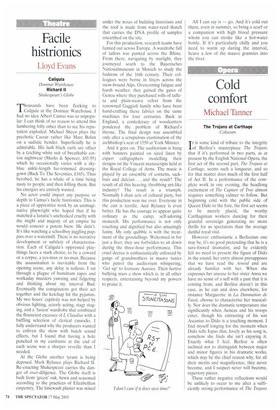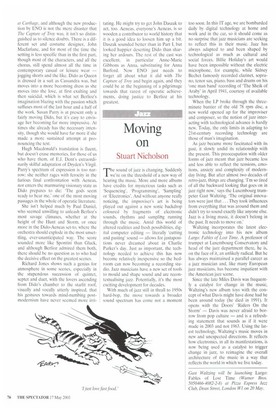Cold comfort
Michael Tanner
The Trojans at Carthage Coliseum
It is some kind of tribute to the integrity of Berlioz's masterpiece The Trojans that if it's performed in two parts, as at present by the English National Opera, the first act of the second part. The Trojans at Carthage, seems such a longueur, and so for that matter does much of the first half of Act II. In a performance of the complete work in one evening, the headlong excitement of The Capture of Troy almost requires something calmer to follow. But beginning cold with the public side of Queen Dido to the fore, the first act seems to be merely placid, the worthy Carthaginian workers dancing for their grateful sovereign generating no more thrills for us spectators than the average dutiful royal visit.
However enthusiastic a Berliozian one may be, it's no good pretending that he is a sure-footed dramatist, and he evidently felt no need to present the figure of Dido in the round; her entry almost presupposes that we have read the Aeneid and are already familiar with her. When she expresses her unease to her sister Anna we have no sense of a self with a past that it is coming from, and Berlioz doesn't in this case, as he can and does elsewhere, for instance Marguerite in La Damnation de Faust. choose to characterise her musically. Nor does the dramatic temperature rise significantly when Aeneas and his troops enter, though his entrusting of his son Ascanius to Dido is a touching moment. I find myself longing for the moment when Dido tells Iopas that, lovely as his song is, somehow she finds she isn't enjoying it. Exactly what I feel. Berlioz is often inclined not to distinguish between major and minor figures in his dramatic works, which may be the chief reason why, for all their merits and magnificence, they never become, and I suspect never will become, repertory pieces.
These rather negative reflections would be unlikely to occur to me after a sufficiently strong performance of The Trojans at Carthage, and although the new production by ENO is not the mere disaster that The Capture of Troy was, it isn't so distinguished as to silence doubts. There is a different set and costume designer, John Macfarlane, and for most of the time the setting is less specific than in the first part, though most of the characters, and all the chorus, still spend almost all the time in contemporary casual or leisure wear — jogging shorts and the like. Dido as Queen is dressed in a suit as Cassandra was, but moves into a more becoming dress as she moves into the love, at first exalting and then suicidal, which is what set Berlioz's imagination blazing with the passion which suffuses most of the last hour and a half of the work, Susan Parry is at present only a fairly moving Dido, but it's easy to envisage her becoming far more impressive. At times she already has the necessary intensity, though she would have far more if she made a more sustained attempt at pronouncing the text.
Hugh Macdonald's translation is fluent, but doesn't erase memories, for those of us who have them, of E.J. Dent's extraordinarily skilful adaptation of Dryden's Virgil. Party's spectrum of expression is too narrow; she neither rages with ferocity in the furious final confrontation with Aeneas, nor enters the murmuring visionary state as Dido prepares to die: 'The gods seem ready to hear me,' one of the most moving passages in the whole of operatic literature.
She isn't helped much by Paul Daniel, who seemed unwilling to unleash Berlioz's most savage climaxes, whether at the height of the Hunt and Storm, or once more in the Dido-Aeneas set-to, where the orchestra should explode in the most unsettling, ever-unanticipated way. The score sounded more like Spontini than Gluck, and although Berlioz admired them both, there should be no question as to who had the decisive effect on the greatest scenes.
Richard Jones shows such a genius for atmosphere in some scenes, especially in the stupendous succession of quintet, septet and duet, with the lovers ascending from Dido's chamber to the starlit roof, visually and vocally utterly inspired, that his gestures towards mind-numbing postmodernism have never seemed more irri
tating. He might try to get John Daszak to act. too. Aeneas. everyone's Aeneas, is so wooden a contributor to world history that it is a good idea to loosen him up a bit. Daszak sounded better than in Part I, but looked happier deserting Dido than sharing her ardours. The rest of the cast was excellent, in particular Anne-Marie Gibbons as Anna, substituting for Anna Burford. Now ENO just needs to forget all about what it did with The Capture of Troy and begin again, and they could be at the beginning of a pilgrimage towards that rarest of operatic achievements, doing justice to Berlioz at his greatest.



































































































 Previous page
Previous page